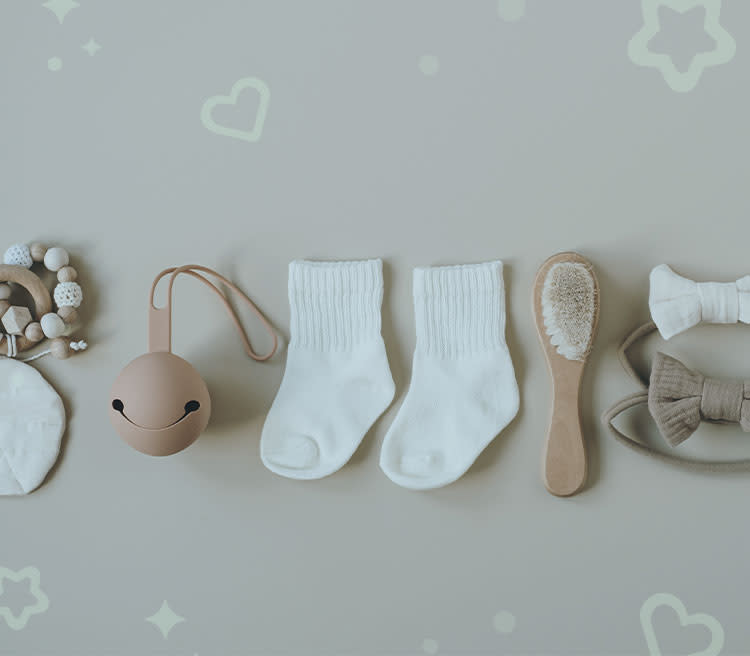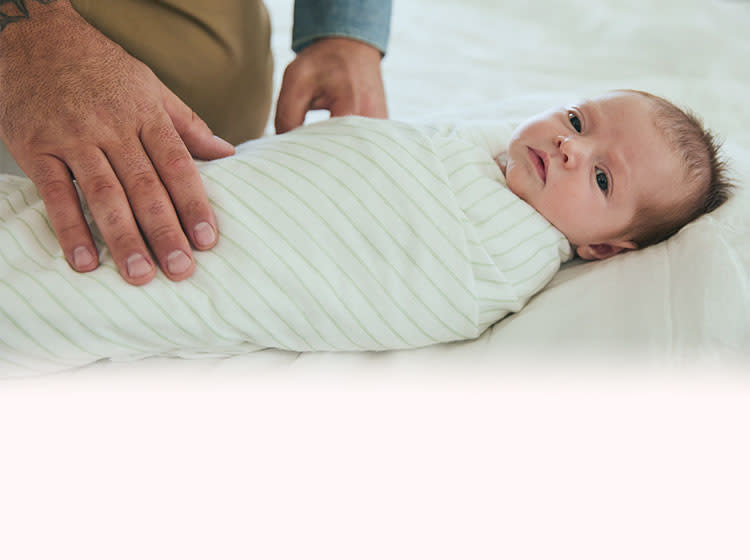It's true that if you look at baby registry lists, there’s often a lot on them, but the truth is that all that baby gear boils down to a few categories, some of which (like items for teething and serving solid food) don’t even come into play for about the first six months of the baby’s life!
Here are the three broad types of newborn baby essentials:
A baby needs to be fed.
A baby needs a safe place to sleep.
A baby needs to be clean.
Once you understand that, along with love, all your newborn really needs is food, sleep, and hygiene, you can start making smart choices for your own personal baby essentials checklist.
Read on for the essential baby items you’ll need.

Essentials for nursery
All the baby essentials for the nursery (and, indeed, the concept of a nursery itself) fall under “safe place to sleep.” This means that the nursery can be a room of baby’s own, a corner of your bedroom, or wherever you have space. In addition to the essentials on this list, you may decide to invest in additional items to make the nursery space as conducive to sleep as possible (white noise machine, blackout curtains, etc.). But here’s where you can begin.
Crib:
Because the baby needs someplace to sleep. This is probably pretty obvious.
Crib mattress:
Again, because the baby needs a place to sleep. It’s not brought up as often as a crib, though, so it can be overlooked.
Mattress protector:
Babies can be messy, so you’ll need a waterproof crib mattress protector to keep diaper blowouts and spit-up from soaking through to the mattress. Ideally, pick up two, so you can throw one in the wash and replace it immediately.
Sheets:
You’ll want at least two crib sheets for the same reason you need multiple mattress protectors: one to wash and one to use while the other is washing.
Baby monitor:
To keep an ear (and an eye if you choose a video monitor) on your sleeping kid.
Swaddle blankets or swaddle sacks:
Newborns sleep best swaddled. Whether you choose blankets or swaddle sacks to make your little baby burrito, get 3 to 5 so you can have a couple in the wash.
Pro Tip: Before using any of these items with your little one, be sure to give them a good wash, even if it’s new or gently used. Use Dreft to clean and freshen blanets, sheets, shams, changing table covers, rugs, and cloth toys, so you can be sure that everything your baby touches is clean.
Baby Clothing Essentials
It’s easy to get carried away with baby clothes—and not just for the new parents! If you’re having a baby shower, there’s likely no need to register for baby clothes because guests will fall over themselves to get adorable tiny outfits for you. However, those clothes are likely to be in larger sizes, so you might need to pick up one or two things for newborns. Here are the baby clothing essentials (along with Dreft Laundry Detergent for prewashing prior to the birth and all your baby laundry needs thereafter, of course).
Pajamas:
Honestly, for the first three to six months, it’s perfectly fine (and ridiculously simple) to exclusively dress your child in one-piece footie pajamas (sometimes called sleep and plays for this age). If your baby will attend daycare, the facility might have a rule that children must either wear socks or be dressed in footie jammies, and trust us, the PJs are easier to deal with than the socks. You’ll need about five sets in “newborn” size and seven to 10 sets of larger sizes.
Onesies:
If it’s too hot to dress your child in pajamas, try a simple bodysuit! No need to add bottoms—what is this, Buckingham Palace? Again, seven to 10 will provide plenty of versatility for covering your kiddo’s butt (literally).
Pants:
OK. So maybe the weather has gotten chilly or you want to take your baby out in the stroller and want more coverage where the straps might touch their legs or maybe you’re visiting Buckingham Palace after all! Whatever the case may be, there can be valid reasons to pair some pants with those onesies. Five sets of comfy, stretchy baby pants should be plenty.
Diapering Essentials
Whether you’re using cloth diapers or disposables, keeping your baby’s butt relatively dry and free of poop is definitely part of that “baby needs to be clean” essential need. Here’s your diapering essentials checklist.
Changing table or pad:
While a changing table is a great and convenient option for some, it is not an essential item for a baby. Many people make do just fine with a portable changing pad spread on the bed or ground, and a caddy to hold the diapers and diaper rash cream nearby. If you find yourself wondering if you have space for a changing table, it’s fine to skip it.
Diaper pail:
You will need someplace to deposit those dirty diapers, and while it is technically possible to carry the diaper out to the trash after each diaper change, the diaper pail is a much more elegant solution. If you’re using cloth diapers, a wet-dry bag hung over the doorknob is a fine solution—get two so you can wash one with each load of diapers.
Baby wipes:
Used to clean poopy baby butts. Whether you’re choosing reusable cloth wipes or disposables, they’re essential, hands down.
Diaper rash cream:
Ask your pediatrician for their recommended brand at your first checkup or get a recommendation from your most experienced parent friends.
Baby Feeding Essentials
You have to keep that little one fed and happy! Here are your baby feeding essentials:
Nursing pillow:
Whether you’re breastfeeding or bottle-feeding, a body-shaped pillow will help you prop up the baby for feeding time.
Burp cloths:
Burp cloths have a specific use case—they’re there to catch any spit-up that might come up when you’re burping the baby after feeding—but they’re incredibly versatile, ready to mop up any mess or spill (which, when you have a baby, is plentiful).
Bottles:
Unless mom is both breastfeeding and willing and able to tie herself to the baby for a year, you’ll need bottles: for daycare, for formula, for a partner or friend to give mom some time off. You can wash them as you go, but you’ll likely still need at least four.
Bottle sterilizer:
Once per day, it’s recommended that you not just wash but sterilize your bottles (and pump parts if you’re using a breast pump). Find a steam sterilizer you can pop into the microwave, and you’re all set.
Bottle warmer:
This is one of those “depends on the baby” items—your child might be perfectly happy with drinking room-temperature formula or bottled breastmilk right from the fridge, or they might fuss and fret until they receive a perfectly warmed bottle. You won’t know until you’re in the parenting trenches, and a bottle warmer isn’t that expensive, so buy one just in case.
Baby Bath Time Essentials
You’ll only need to bathe a newborn baby about twice a week; this is true for at least the first year. Also, bath toys—the first thing many people think of when they envision baby bath essentials—won’t be interesting to the baby for at least six months, so you’re free to develop a relaxing bath time routine that works for you.
Baby bath seat:
This can be one of the fancy seats you often see on “best of” lists, or it can be something simple—basically, a giant sponge the baby lies on in the sink or tub.
Shampoo/body wash combo:
Most baby brands will combine their baby shampoo and body wash into a single, tear-free product, all to make your life easier at bath time.
Towels:
Your normal towels are probably fine for babies; they just might be a little big for newborns. Plus, baby towels usually have a hood to dry their heads, keep them warm. Just be sure to wash them before using Dreft’s gentle, non-irritating formula, to avoid itchy towels on baby’s skin.
Washcloths:
Baby skin is a delicate and sensitive, and picking up gentle, specialized washcloths for babies is one way to help protect it.
Baby Health Essentials
Keep that kiddo groomed, healthy, and safe with these baby essentials.
Nail clippers:
You’ll need to clip your baby’s nails every week or so to keep them from growing so long that they pose a danger to themselves and others.
Thermometer:
For newborns, you want a rectal thermometer that delivers its reading as quickly as possible.
Bulb syringe:
This is not going to feel like an essential at first, but the first time your child spits up while on their back and you can tell there are chunks of partially digested milk still in their mouth, you’ll understand its purpose.
Toothbrush:
A soft toothbrush made of silicone can double as a teething toy, getting kids used to the texture of a toothbrush before their teeth even come in.
First-aid kit:
A first-aid kit for babies will likely include all of the above items, plus extras like spoons and syringes for delivering medicine.
Baby Gear Essentials
Whether your baby is on the go or chilling at home, these are the essential baby items that can keep them safe and happy.
Car seat:
If you have a car, you need a car seat. It’s as simple as that. For newborn babies, it’s best to get an infant car seat with a carrier that snaps into a base; since newborns spend a lot of time sleeping, this will allow you to bring them from place to place without waking them up. What’s more, if the baby will be riding in more than one car, you probably need additional car seat bases for each of those cars—don’t presume you can “just swap the base” each time. That gets old fast.
Blanket:
When you must put your newborn in the car on cold days, don’t struggle with a coat. It’s both easier and safer to tuck a warm blanket around their sides once they’ve been strapped into the car seat.
Diaper bag:
We put the diaper bag in this section rather than “diapering” because it’s so much more! A diaper bag is your repository for all “just in case” needs while you’re on the go with your baby—diapers, sure, but also extra clothes, toys, feeding needs, and anything else you might require.
Stroller:
There’s nothing better than a walk around the neighborhood with a stroller—you get exercise, your kid gets stimulation to build their tiny mind, and you both get some fresh air and time outside the house. Look for a “travel system” that allows you to snap your car seat carrier into your stroller.
Infant carrier:
When you’re out and about at a park, a pumpkin patch, or a public event where a stroller doesn’t make sense, you’ll need to literally strap the baby to your body.
Play mat:
A play mat or baby gym is a great way to give your young baby some stimulation and a good place for tummy time.
Toys:
Most toys aren’t that interesting to newborns—your child might be a full year old before they take an interest in any of the beeping electronic toys it’s so popular to give kids. Still, there are a few toys that interest all but the very youngest babies. Infants that are a few months old will begin showing an interest in rattles, and once teeth begin to make an appearance, anything chewable is like gold.
Frequently Asked Questions About Baby Essential Items
What do you need for a baby in the first three months? During the first three months, a baby mostly just sleeps and eats, so you need to keep the baby fed (through nursing or bottle-feeding), keep them clean (diapered and bathed), and give them a safe place to sleep (swaddled, on their back, in a crib or bassinet with a fitted sheet and nothing else for them to get tangled in).
What are necessities for a newborn baby? The biggest necessity for a newborn is love and affection to help them feel secure in the big new world. Second is a tie between food (breast milk or formula) and a supply of diapers to keep them clean. Third is a safe place to sleep.
What are five things babies need?
Diapers and wipes
A crib or bassinet with sheets and mattress protector
Swaddle blankets or swaddle sacks
A car seat
Footie pajamas to wear
With so many baby products on the market, it can be difficult to figure out which are the true baby essentials and which are just extras. Thinking about your baby’s basic needs can help you decide. If you’re trying to save money, space, or hassle before your baby is born or if you’re just a minimalist, focus on the baby essentials, try using the minimum you need, and know that you can always scale up if you want. (For a more maximalist approach, check out our baby registry checklist).

